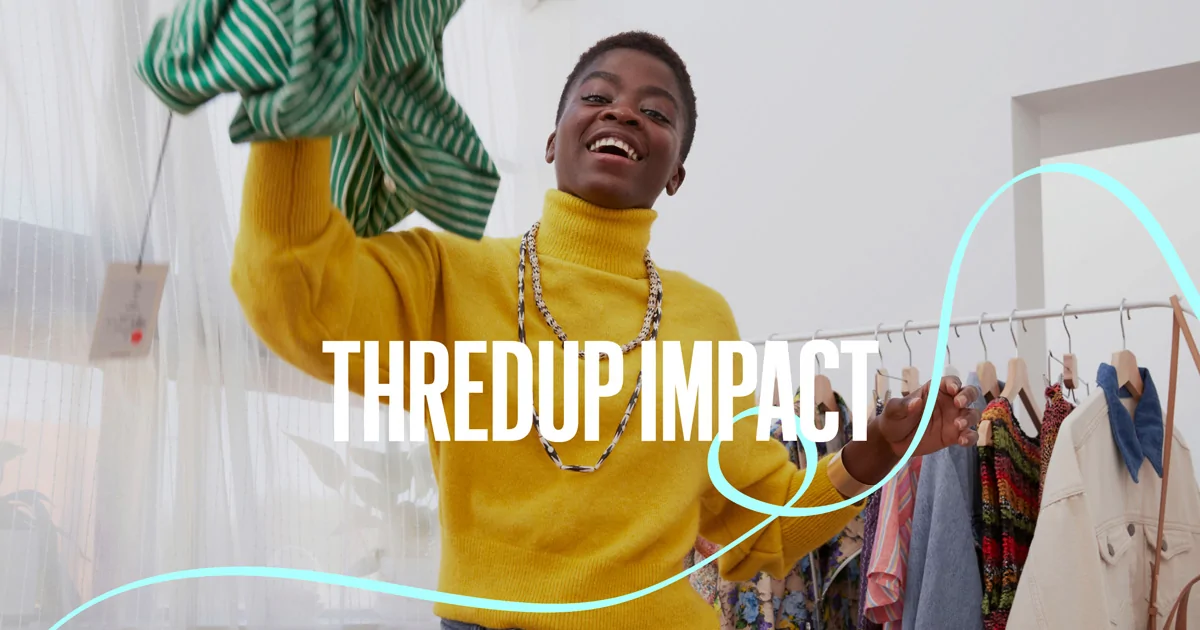New Study From thredUP Shows Secondhand Clothing Is Displacing Fast Fashion

Image: Collected
A year of residing in a pandemic caused a shift in consumer behavior across industries. Predictions came mid-last year that sustainable clothing categories, particularly resale, would visit a significant increase while shoppers looked to both sell their old items sitting at home and cut costs when buying new ones. Now, online consignment and thrift store thredUP’s 2021 Resale Report is here now with data to prove these theories correct.
Consumers experienced a shift in values
2020 was a year characterized for many by “waste not, want not,” and several of these practices are carrying over into new lifestyle choices. According to thredUP’s report, 33 million people bought secondhand apparel for the very first time in 2020 and 76% of these plan to increase devote to secondhand clothing within the next five years. The secondhand market share is currently likely to grow nine points in a decade, which is larger than any other apparel sector.
These decisions are made due to an elevated interest, and need, to save lots of money and protect the surroundings.
“Driven by both value and values, consumers say they plan to spend more on resale than any other category within the next five years,” said Karen Clark, vp of marketing communications at thredUP.
Shoppers are losing interest in fast fashion
Fast fashion can often be connected with low-quality clothing and high-waste production, but overlooked due to a consumer desire to remain up-to-speed with the most recent fashion trends at an inexpensive.
Now, 51% of consumers report they’re more opposed to eco waste than prior to the pandemic, 43% say they care more about clothing quality and 25% care less about wearing the latest trends. Plus, 45% of millennials and Gen Z are refusing to get from non-sustainable brands and retailers. Due to this fact, secondhand is likely to become twice as big as fast fashion by 2020.
Sustainability cannot mean unaffordability
While an elevated interest in eco-friendly clothing is a valid threat to fast fashion, it is only sustainable to all or any consumers if offered by accessible prices. That's where thredUP believes secondhand clothing will bridge a gap.
“Much of the sustainable fashion market is inaccessible or cost prohibitive,” said Clark. “Secondhand marries consumers’ financial demands and environmental values. Democratizing sustainability in this manner is the path to mainstream adoption.”
thredUP is excited for the impact these findings could have in government policy surrounding circular fashion, and believes the industry could be the next thing forward in standardizing sustainability policy. With 542 million apparel items purchased secondhand rather than new in 2020, these goals are beginning to feel attainable.
“While we’ve always known intuitively, here is the first year we've data that proves secondhand is actually displacing new clothing purchases,” said Clark. “As secondhand is growing and more consumers, brands and retailers extend the life span of clothing, we predict this may reduce overproduction and make a meaningful environmental impact.”
Consumers experienced a shift in values
2020 was a year characterized for many by “waste not, want not,” and several of these practices are carrying over into new lifestyle choices. According to thredUP’s report, 33 million people bought secondhand apparel for the very first time in 2020 and 76% of these plan to increase devote to secondhand clothing within the next five years. The secondhand market share is currently likely to grow nine points in a decade, which is larger than any other apparel sector.
These decisions are made due to an elevated interest, and need, to save lots of money and protect the surroundings.
“Driven by both value and values, consumers say they plan to spend more on resale than any other category within the next five years,” said Karen Clark, vp of marketing communications at thredUP.
Shoppers are losing interest in fast fashion
Fast fashion can often be connected with low-quality clothing and high-waste production, but overlooked due to a consumer desire to remain up-to-speed with the most recent fashion trends at an inexpensive.
Now, 51% of consumers report they’re more opposed to eco waste than prior to the pandemic, 43% say they care more about clothing quality and 25% care less about wearing the latest trends. Plus, 45% of millennials and Gen Z are refusing to get from non-sustainable brands and retailers. Due to this fact, secondhand is likely to become twice as big as fast fashion by 2020.
Sustainability cannot mean unaffordability
While an elevated interest in eco-friendly clothing is a valid threat to fast fashion, it is only sustainable to all or any consumers if offered by accessible prices. That's where thredUP believes secondhand clothing will bridge a gap.
“Much of the sustainable fashion market is inaccessible or cost prohibitive,” said Clark. “Secondhand marries consumers’ financial demands and environmental values. Democratizing sustainability in this manner is the path to mainstream adoption.”
thredUP is excited for the impact these findings could have in government policy surrounding circular fashion, and believes the industry could be the next thing forward in standardizing sustainability policy. With 542 million apparel items purchased secondhand rather than new in 2020, these goals are beginning to feel attainable.
“While we’ve always known intuitively, here is the first year we've data that proves secondhand is actually displacing new clothing purchases,” said Clark. “As secondhand is growing and more consumers, brands and retailers extend the life span of clothing, we predict this may reduce overproduction and make a meaningful environmental impact.”
Source: https://www.adweek.com
Previous Story
- Mr. Porter introduces a classic golf clothing collection
- Rent the Runway, before rumored IPO, ditches registration...
- Etsy to get second-hand fashion program Depop for...
- Vogue’s Information to the very best Memorial Day...
- Brief guide on mens clothes buying
- Shop the 41 best Memorial Day clothing revenue...
- Vintage clothing continues to be very much in
- Amazon's Summer Fashion Sales: Best Deals on American...